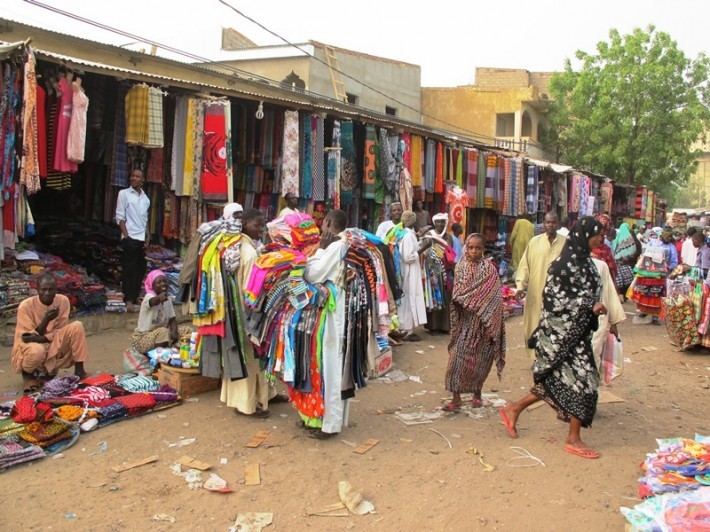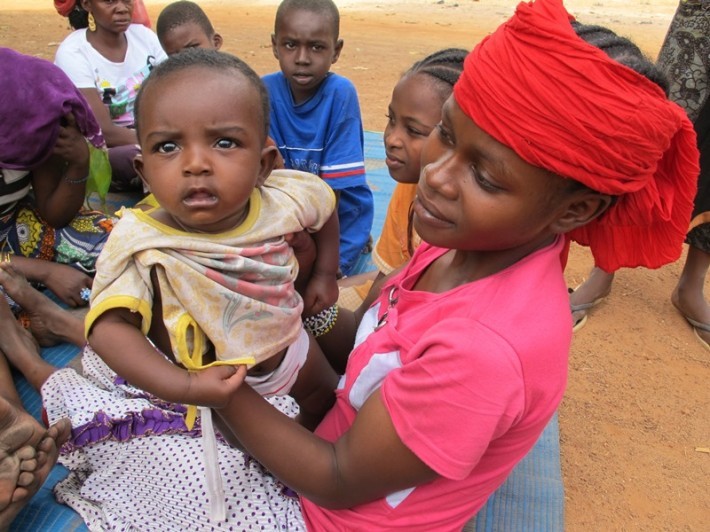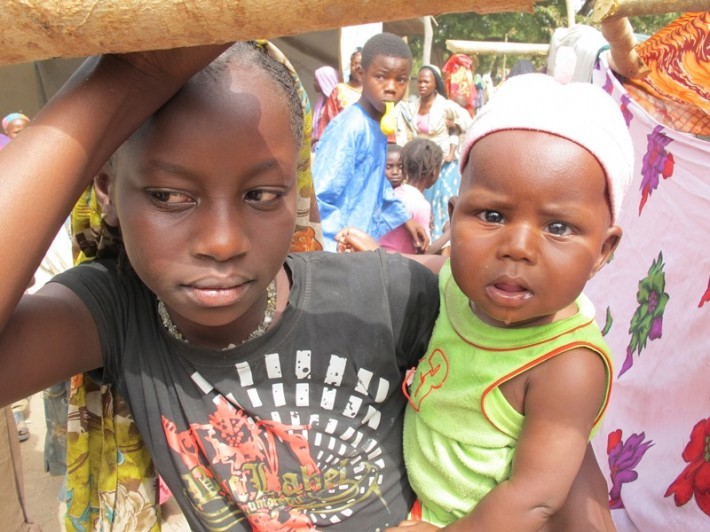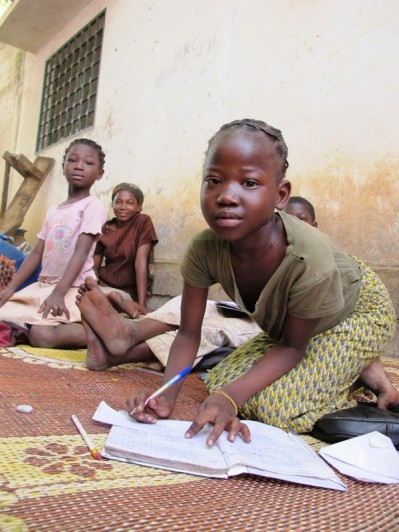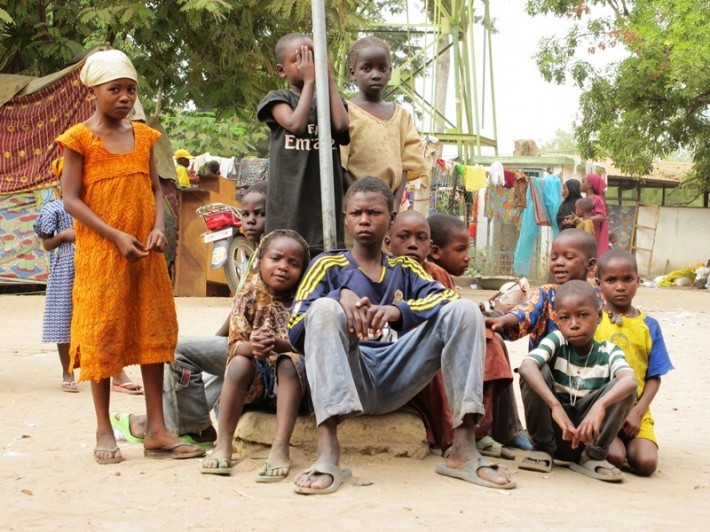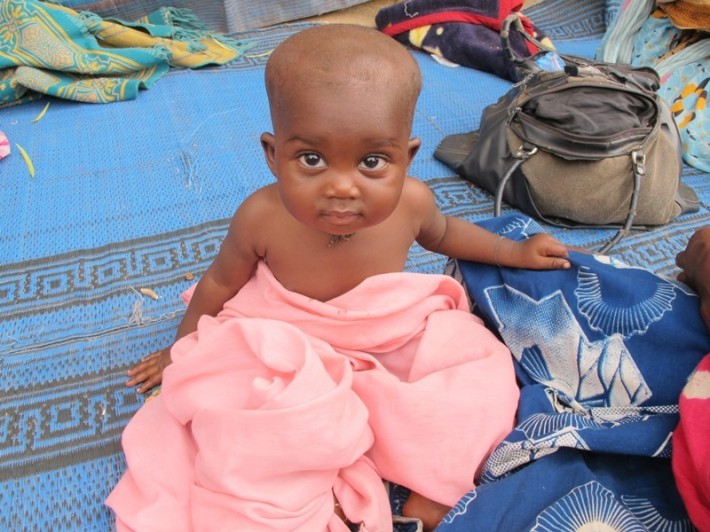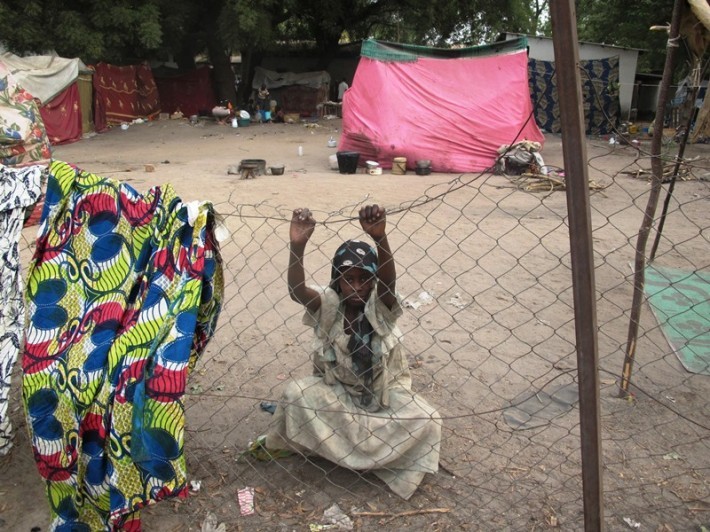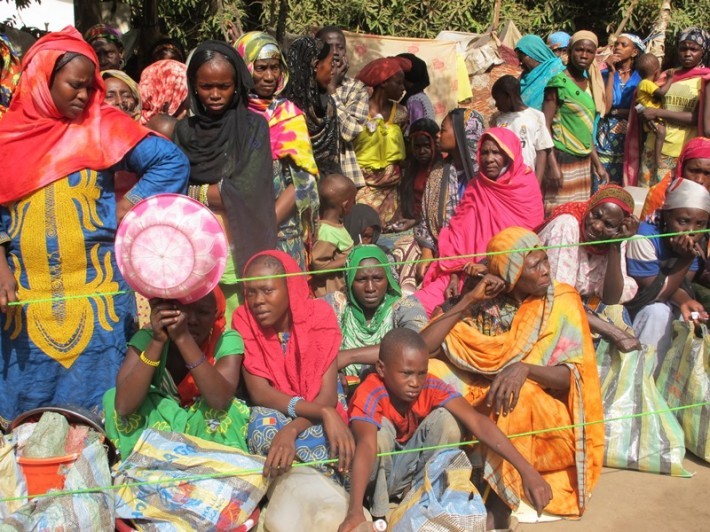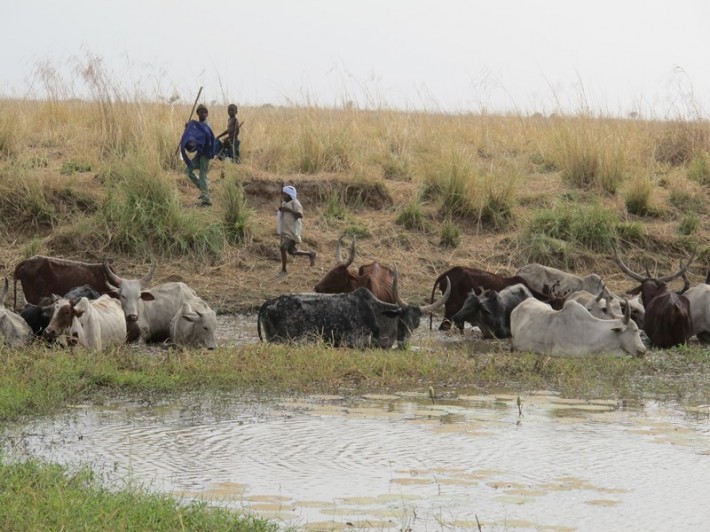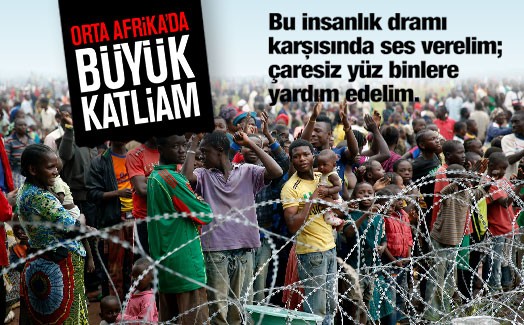
Just last week I was right in the middle of Africa, the darkest corners of the black continent. I was located in the borders of two of the worst ranked countries on the world index of democracy. I was located in the depths of poverty, corruption, burglary and colonialism. I was roaming the streets of the graves of children who had died as a result of malaria, yellow fever and civil war; I walked amongst the children who had succeeded in surviving by managing to get away from the angel of death and his scythe. I set forth from the Sahara Desert towards the African savannah by surpassing 1200 kilometres of road before reaching my final destination, the outskirts of Central Africa. I stayed in one of the refugee camps with people, who had been displaced from their land and all assets lost. I listened to stories of people who lost their mothers, fathers, spouses, children and loved ones. Despite my dark and dreary journey, I brought to you the photographs of children running around, senselessly chasing balloons that they’ve never before seen. I intended to inform you of what is going on in the world from the wake of domestic politics, moreover, I wanted for you to feel rejoice by taking a moment to look at these distinct photographs.
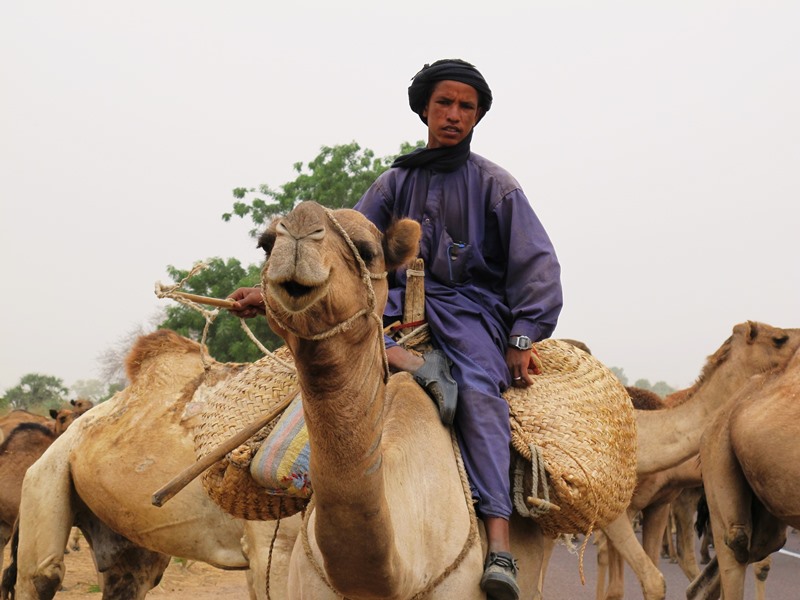
Why did I go to Africa?
Lately, images from the Central African Republic may have caught your attention. The most striking of them all are the images from the capital Bangui where a man was dragged and beat to death with blows to the head. Not to mention the sickening images of where militias roamed the streets with ripped arms and legs. From December until now, hundreds of similar images were leaked via various agencies. Within the country there is a Christian mob, given the name anti-balaka, which attacks Muslim minorities. We were informed that pregnant women were also amongst the targeted and that people were cut into pieces while live and were then fed to crocodiles.
Until Colonialists Arrived
I spent a lot of time wondering as to whether or not the matter was in fact a religious war or if there were more than met the eye. At this moment I received a phone call from IHH Humanitarian Relief Foundation. I was informed that a team was going to be dispersed to the refugee camps located on the outskirts of Chad and the Central African Republic to aid in the refugee camps. Within a few days we had completed all preparations and set out. I had been to neighbouring countries before but had never step foot into territories where the tragedies actually took place. I went, I saw, and realised how little I knew about the world we live in. Let me share with you what I learned about the Central African Republic.
Research has shown that mankind existed in these lands since the Palaeolithic era. In fact, up until the 19th century people would just live their simple lives. Most of the country consisted of Animists, Muslims and Christians. However, in 1887 a French explorer published a report after being in the area regarding the lands wealth and economic values and circumstances changed in Africa. Due to the report, the French government decided to include the region into their colonial system and sent their first military unit in 1889 to the capital of Bangui. Within a few years they had colonialized the entire country.
Life in the Central African Republic has never been the same ever since. Missionaries replaced legionaries and connected most Animist communities to the Christian church. The population of the Central African Republic is comprised of 50% Christians, 30% Animist and 20% Muslim. Some may ask themselves as to which of these communities are poor and which of these communities sustain a wealthy way of life? All are poor and miserable because the westerners (northerners to them) brought the Bible, however, within the last century and a half they have been depleted of all of their resources. It took a long while for the African population to realise that the price tag of the bibles was too heavy. The gross national income is roughly 731 dollars. The country is rich in resources such as gold, oil, nickel and diamonds, however, the Central African Republic also has one of the world’s highest maternal morality ratios in the world where there is a 1 in 27 risk of dying during pregnancy or childbirth. Health services are a serious problem in the Central African Republic. The Central African Republic is struggling with malaria, leprosy, AIDS, narcolepsy and other health issues, not to mention never-ending coups.
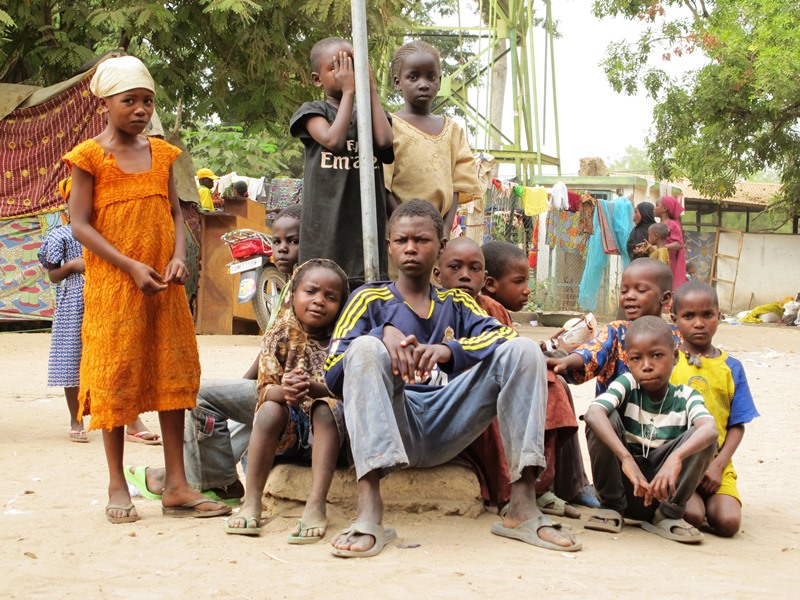
The Coup Era Begins
The Central African Republic declared its independence from France in 1960 when a man by the name of David Dacko was voted in. David Dacko was replaced by a military officer by the name of Jean Bédel Bokassa where he named himself head of state. As despotic as he was, he was a self-proclaimed emperor when he declared himself King Bokassa I in 1976. Three years later David Dacko returned and while Bokassa was in Libya he attempted another coup and succeeded and took over the state once more. A few years down the line someone else replaced Bokassa and another replaced him. Coups in the Central African Republic did not cease, all of which was in France’s best interest.
Corruption, famine and plague did not find an end; on the contrary, it increased and soon became out of control. Muslims located in the north of the country revolted against this state of condition and took up arms with Christian rebels and marched towards the capital. This political movement was named the Séléka Coalition and replaced the government in the Central African Republic in March, 2013. The president was replaced by a Muslim politician by the name of Michel Dijotodia; the prime minister was a Christian politician by the name of Nicolas Tiangaye. This new government gave their word that they would go into elections within 18 months and just as things were going to go as planned a Christian militia group named anti-balaka destabilized the country.
The Christian militia group, anti-balaka, began attacking highly populated Muslim areas and began in the capital and made their way to execute Muslims while praying, en masse. These ongoing events which began last December resulted in 1600 deaths, most of which are Muslim. The Central African Republic has a population of 4.5 million and as a result of the clashes 785 thousand people have abandoned their homes; due to businesses, banks and clinics being closed down 2.2 million people are in need of aid. Another 200 thousand people have fled to neighbouring countries, Cameroon and Chad, in an attempt to save their lives. These events that upset the lives of millions of people are one of many reasons that led us to Africa.
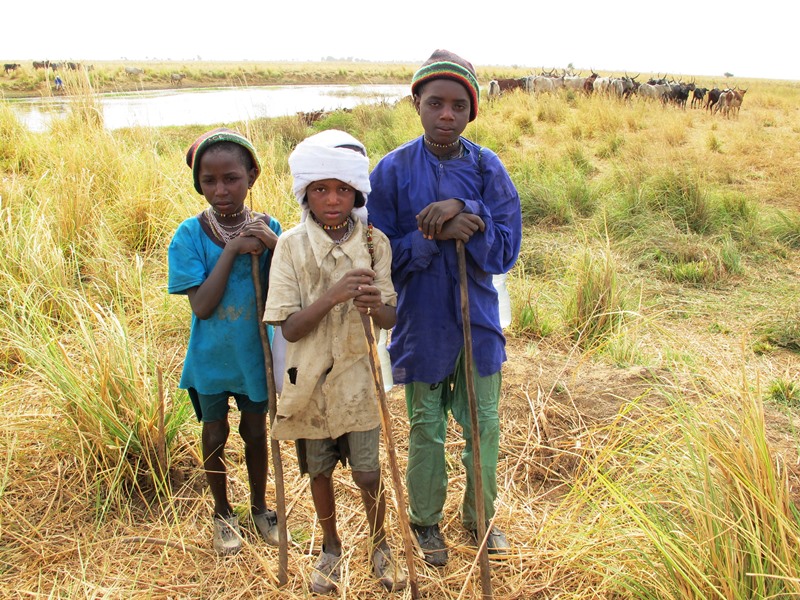
The Electrical Engineer of an Unlit Country
Entry into and out of unstable regions within Central Africa has been banned by French military and African Union forces, thus, we were forced to go to the capital of Chad, N’Djamena. An IHH delegation consisting of three people including IHH Africa Desk Coordinator Serhat Ekinci intended to obtain our essential needs in N’Djamena and transport them to the refugee camps in the Central African Republic. I myself had the opportunity to go shopping in the markets along with the delegation. This was a great opportunity for me because markets are what narrate a countries story. I was also able to visit Sudan with Serhat Orakçı, one of Turkey’s most important Africa experts.
We obtained our essential needs from the capital city, 1200 kilometres away from the refugee camps because down the road, towards the camps, the prices of our needs double and triple. I had the opportunity to meet a nice African name by the name of Ahmad Fadil. Ahmet Fadil, from one of Chad’s leading families, is an electrical engineer. Even in Chad’s capital, N’Djamena, only 20% of buildings actually have electricity. The remaining population meet their needs via administration lamps, candles and generators. Ahmad, although being an electrical engineer, meets his electrical needs with a generator.
It is predicted that due to the discovery of oil in northern and southern Chad, the country will be illuminated within the next 10 years. Ahmad spent seven years in Turkey, learning a good deal of Turkish. As soon as he finished his studies in Turkey, Ahmad returned to Chad and decided to serve those in need. Ahmad is also responsible of IHH Africa Desk Organisations and works day and night. He took the IHH delegation alongside himself to the most reliable merchants available. Ahmad, alongside Serhat, spent a great deal bargaining with merchants and in the end acquired essential needs such as flour, sugar, oil and rice and loaded them onto the trucks. From thereon, they set out to what was a week-long journey where Ahmad acted as their guide.
Africa’s Retribution
We were headed south from the capital, right in between drought and blessing. During our journey we passed through villages, small towns, never-ending forests and fields and did not run across any other “white man” but ourselves. Not much whiteness was left of us amid our journey as we were covered in dust and smoke. Reaching the peak of anti-colonialism movements towards the 1960s, there was much justified and reasonable hatred towards the gold etching white man.
Within a time frame of 15-20 years about 8 million white people were forced to migrate away from Africa to the countries they first came from. Initially there was hatred towards the white man but this changed and turned towards some white Arabs as well. Eighteen million people were enslaved in the African continent over a period of five centuries and Arab merchants played a key role in selling them to the American continent primarily, as well as the rest of the world and thus, Arab merchants were expelled from parts of Africa. In this manner, Africa’s colour was restored, however, with the absence of the white men, the African population turned against one another. It was now a struggle between not colour, but the tone of their skin and the darker toned people came into power; corruption, despair and poverty continued. Africa was lost in the darkness they once craved and yearned for.
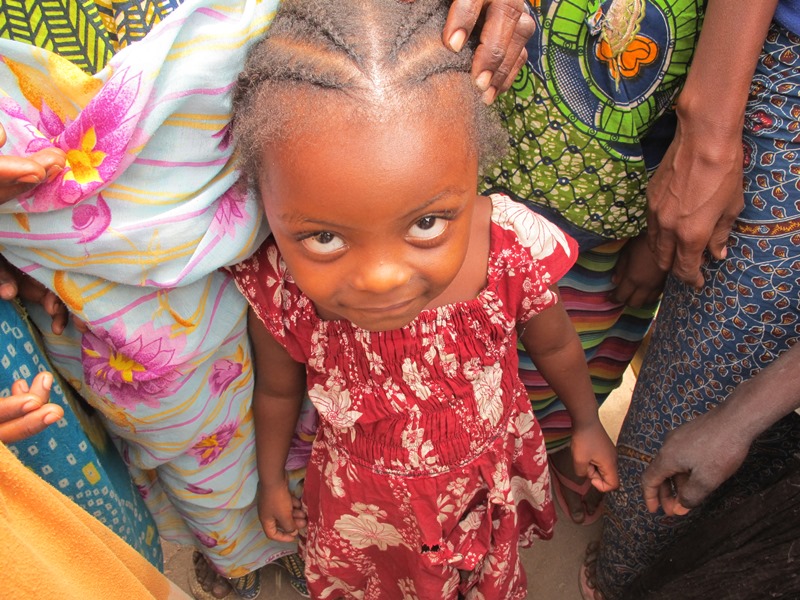
A Fatherless Little Girl
There was a child among them; much different. She would constantly smile and follow me whenever she would see me; she would grab a hold of my trousers while I was walking and even then laughter was not absent for a moment. I was able to get away onto a station wagon for a moment to take a photograph; within two minutes she was all up on me once more. I got down off of the truck and was able to hide my trail. The following day I was roaming the streets, studying the environment and suddenly from behind a tree it was the same girl. As she jumped me I couldn’t help myself and broke into laughter. This time she broke out into laughter while clinging onto my trousers again. Two days later Serhat showed me a photograph and said “do you see this little girl; she clings onto my trousers wherever she sees me.” I took a look at the photo and saw that it was our little bag of laughter. We gave her the nickname “Paçacı,” however, we felt sorry immediately and regreted doing so. It turns out this little girl’s father was a half-breed and was killed 3 months ago. When her mother told us that “she hugged and clinged onto the trousers of her father when she last saw him” we better understood the situation; we were white and she likened us to her father.
7km Daily Walk for Access to Water
Along the road we realised that there are no modern water facilities in any of the settlements we came across. There are water wells built by volunteers from Muslim countries via Western humanitarian aid foundations and agencies. Water from these wells can be obtained by pumps and due to the fact that these wells are surrounded by settlements, cesspools pose a threat. It is due to this exact reason that out of every 1000 children born in Africa, 112 of them die within their first year. No matter where I went I bared witness to countless women carrying water on their heads, backs or in wheelbarrows. It came to me as no surprise that in an article I read months ago, women walked an average 7 kilometers to bring water to their homes.
Africa, with a population of roughly 1 billion people, it also has the world’s highest maternal morality ratios in the world. In a 2012 United Nations report, about 287 thousand mothers died while giving birth in sub-Saharan Africa. According to a 1990 census, the number of deaths was a mere 543 and within the last 20 years the deaths of mothers has decreased by 50%. Within the same time frame it was recorded that the child mortality count went from 12 million to 7.6 million.
It is well known that if there wasn’t any mugging and if political stability were to be provided, Africa would come a long way in a short period of time because this beautiful continent consists of 50% of the world’s gold, 30% of the world’s diamond, 90% of the world’s cobalt and platinum, 70% of the world’s coltan (primarily used in the making of cellular phones), and 98% of the world’s chromium resources. The continent also possesses three times more oil than it needs to sustain itself. However, these resources are being plundered by colonial powers alongside their local partners. It is because of this that political stability cannot be provided. According to a United Nations Human Rights report, the bottom 25 countries in the world rankings are all from the African continent.
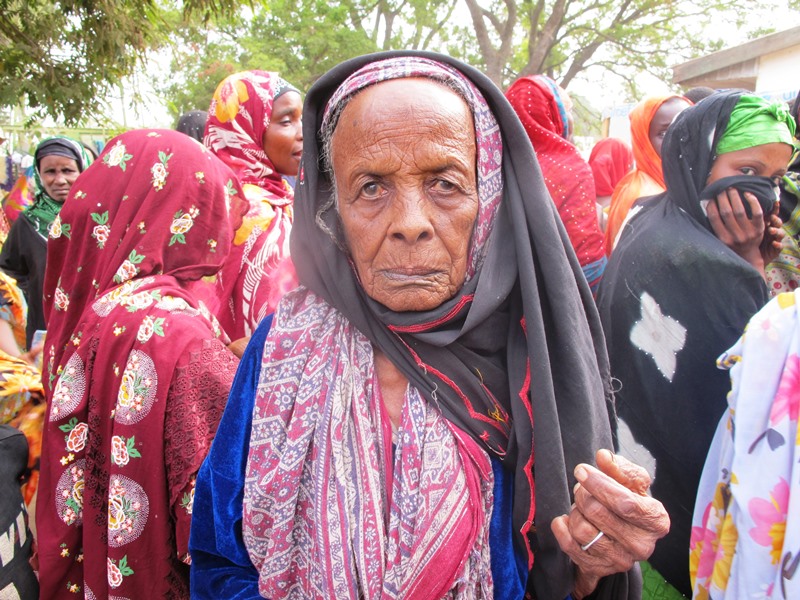
Where Have You Been All These Years?
Some refugee camps are located in a city called Gore, the southernmost region in Chad. Our journey from the capital to the city took us about 15 hours by car. There are roughly 100 thousand refugees seeking refuge in Chad. Chad, in need of aid itself, is doing its best to provide for the refugees. The Red Cross also ships humanitarian aid to the camps. The IHH delegation along with the Gore state governor visited the southern state governor and was left in awe. “You had all suddenly left 100 years ago; you come back for the first time in a long time. These lands have seen the face of Turks for the first time in a century,” said the southern state governor. We were surprised and overwhelmed with sadness. When the same governor mentioned that the IHH was the first relief foundation out of a 1.5 billion wide Muslim world, we then realised the extent of the situation and how isolated and desperate the region truly was.
Children and Balloons
The relief team brought toys for the children alongside essential needs and among the gifts were balloons. Alongside our gifts to the children we handed out balloons. A day later we realised that the balloons were as they were when we first handed them out and I sought someone who knew English and said “why do the children not inflate their balloons?” I realised the state of the situation when he said “these are inflatable?” I took a balloon, inflated it and threw it up into the air and just then a state of pandemonium was unleashed. Then someone else ran up to me with a balloon; I inflated that balloon as well. The world around us became full of joy and smiles. Just like that, I bring to you the greetings of children who have never seen a balloon in their lives; I bring to you the tidings of fatherless children.
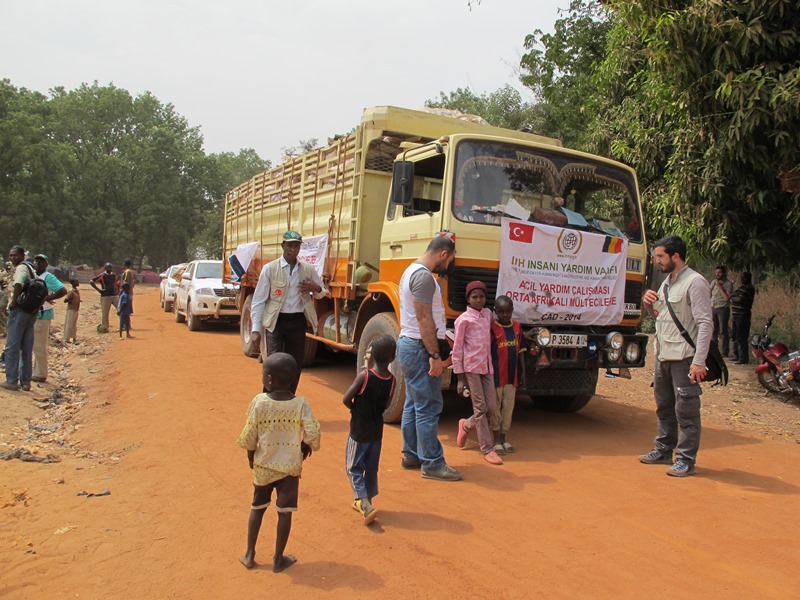
Hospital Request from IHH
We woke up early in the morning and headed out to the refugee camps. People have pitched makeshift tents using their belongings. We better understand the need for shade if we were to contemplate that the weather is averaged at 36 degrees Celsius during the summer and 24 degrees Celsius at night. Due to the region being so close to the equator, citizens averaged at the age of 60 are diagnosed with cataract. Damage to the cornea as a result of sunlight and dust is quite common in the Central African Republic and Chad; however, there are no proper treatment facilities or hospitals located outside the capital city. Old men and women gathered around us and lined up as they thought we were doctors and they were going to receive eye exams. On our way from Chad, Serhat said to one of the regions governors that “if a hygienic environment were to be provided, we would be able to bring volunteer doctors from Turkey to help cure the sick.” The governor stated that it would be of much importance for doctors to come, however, it would be of much gratitude if Turkey would provide the hospital as well. Serhat stated that he would deliver the request for the hospital to IHH headquarters.
What Colour is a White Man?
Most children at the refugee camps had seen a white man for the very first time in their lives. Some were frightened and cried while most of them gathered around me out of curiosity. As I sat down to play with them I would be approached by children, they would run their hands on my face in an attempt to find out if the colour of my complexion was a result of paint or not. The reasoning behind this was because during African festivities and holidays, magicians would ward of evil spirits through dance and would cover themselves in quicklime to do so. The children most probably thought I was a magician myself! The complexion of my skin, love and affection towards the children was genuine and when they felt this they began showing signs of affection by rubbing their faces against my face and arms. At first I did my best to keep my distance to prevent any transmission of bacteria or diseases but after a while I told myself “forget it, these children have lost everything, you might as well let them have fun with you.” And that is exactly what I did.


